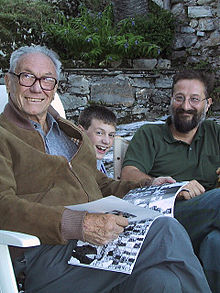Fosco Maraini
| Fosco Maraini | |
|---|---|
 |
|
| Born |
15 November 1912 Florence, Italy |
| Died | 8 June 2004 (aged 91) Florence, Italy |
| Nationality | Italian |
| Fields | Ethnology of Tibet and Japan |
| Influences | Giuseppe Tucci |
Fosco Maraini (15 November 1912 – 8 June 2004) was an Italian photographer, anthropologist, ethnologist, writer, mountaineer and academic.
As a photographer, Fosco Maraini is perhaps best known for his work in Tibet and Japan. The visual record Maraini captured in images of Tibet and on the Ainu people of Hokkaidō has gained significance as historical documentation of two disappearing cultures. His work was recognized with a 2002 award from the Photographic Society of Japan, citing his fine-art photos—and especially his impressions of Hokkaido's Ainu. The society also acknowledged his efforts to strengthen ties between Japan and Italy over 60 years. Maraini also photographed extensively in the Karakoram and Hindu Kush mountain ranges of Central Asia, in Southeast Asia and in the southern regions of his native Italy.
As an anthropologist and ethnographer, he is known especially for his published observations and accounts of his travels with Tibetologist Giuseppe Tucci during two expeditions to Tibet, first in 1937 and again in 1948.
As a mountaineer, he is perhaps best known for the 1959 ascent of Saraghar and for his published accounts of this and other Himalayan climbs. As a climber in the Himalayas, he was moved to describe it as "the greatest museum of shape and form on earth."
From 1938 to 1943, Maraini's academic career progressed in Japan, teaching first in Hokkaido (1938–1941) and then in Kyoto (1941–1943); but what he himself observed and learned during those years may be more important than what he may have taught. Dacia, his eldest daughter, would decades later recall that "the first trip I took was on the sea from Brindisi to Kobe." Two of his three daughters were born in Japan: Yuki was born in Sapporo in 1939, Antonella (Toni) in Tokio in 1941. After the Italians signed an armistice with the allies in World War II, the Japanese authorities asked Maraini and his wife Topazia Alliata to sign an act of allegiance to Mussolini's puppet Republic of Salò. They were both asked separately and separately they refused, and were interned with their three daughters of six, four and two years old in a concentration camp at Nagoya for two years. Those memories of 1943 through 1946 evolved into some chapters of the book "Meeting with Japan" by Fosco Maraini. Dacia Maraini's collection of poetry drawn from those difficult years, Mangiami pure, was published in 1978.
...
Wikipedia
